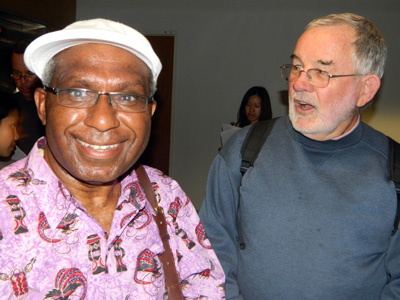
AUCKLAND (Pacific Media Centre / Pacific Media Watch): Across the Pacific, advocates of media freedom hosted many World Press Freedom Day celebrations this year.
Australia, Fiji, New Zealand, Papua New Guinea, Samoa and the Solomon Islands were among the countries to commemorate the 20th anniversary of the UNESCO event on May 3, which focuses upon securing freedom of expression in all forms of media.
According to UNESCO, more than 600 journalists have been killed globally in the last decade — 121 died last year alone.
“All these journalists had one thing in common,” says Tim McBride, deputy chair of New Zealand National Commission for UNESCO communications sub-commission.
“They were all exercising what many in our society appear to take for granted: the fundamental right to freedom of expression.
“These journalists were murdered for simply doing their jobs.”
Digital media
Professor Mark Pearson of Griffith University delivered the keynote address at New Zealand’s inaugural WPFD celebration, which was hosted by Auckland University of Technology’s Pacific Media Centre.
Dr Pearson highlighted press repression in Fiji, Brunei, Malaysia and Singapore, but emphasised that the issue stretches far beyond the Asia-Pacific region.
Sedition, defamation and anti-terror laws arm governments across the globe with ammunition to intimidate media in this era of technological advancement, he said.
“My observation has been that governments are quick to enact laws to control emerging social and technological situations, but are loathe to wind them back when they prove unjust or the reasons for their existence have long gone,” Dr Pearson said.
Traditional media, he argued, are not just fighting government regulation and censorship.
Social media, citizen journalists and bloggers are stealing both readership and advertising dollars from established outlets.
According to Dr Pearson, as Australian, New Zealand and North American media organisations struggle to fund coverage of Asia-Pacific affairs, the quality of foreign correspondence in the region is declining.
“This means the policies of governments in Pacific Island nations are exposed to less international scrutiny and that breaking news is more likely to be covered ‘on the cheap’ by so-called ‘parachute journalists’ who fly in and out to report in a superficial way,” he said.
Celebrating in PNG
In Papua New Guinea, WPFD event organisers at Divine Word University welcomed citizens from underreported communities to share their stories and concerns with the public.
“Although we say that we have a free media in PNG, these people are left out of the information cycle,” said Br Michael McManus, head of communication arts at DWU.
In the Solomon Islands, the Pacific Freedom Forum hosted a workshop on establishing a regional Pacific Media Ombudsman for adjudicating on issues, particularly in countries that have no media self-regulatory bodies.
In Fiji, more than 250 students, media professionals and school children attended the University of the South Pacific’s two-day UNESCO World Press Freedom Day celebrations.
Read the full report here
This work is licensed under a Creative Commons Attribution-NonCommercial 3.0 New Zealand Licence.



